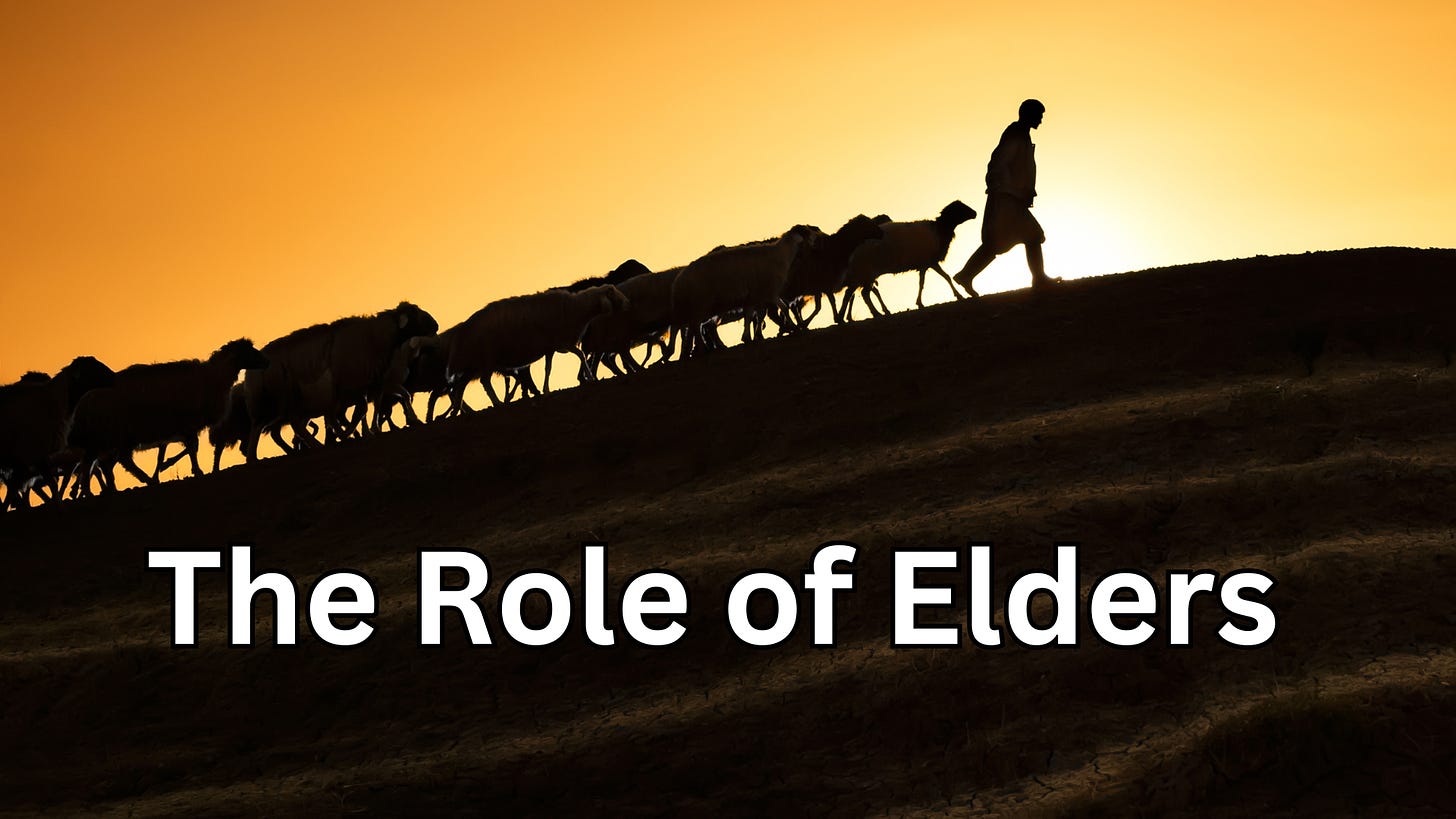The Bible often uses the image of a shepherd with his sheep to describe God’s loving care for His people (Psalm 23:1-2; John 10).
Both Paul and Peter use the shepherd imagery to encourage elders of the Lord’s church to do their work (Acts 20:28; 1 Peter 5:2).
Properly understanding the role and work of elders means considering their work along the lines of shepherds who protect, feed, lead, and care for the flock.
Protect the Flock.
The elders protect the flock - the church...
From false teachers (Acts 20:17, 28-31; Titus 1:5-6, 9; Acts 15).
By seeking the lost, straying sheep (Luke 15:4-7; Psalm 23:3).
By disciplining sin (1 Corinthians 5), correcting improper behavior and attitudes (1 Thessalonians 5:12-13), and stopping bitter strife among the flock.
This requires elders to be spiritually alert. Paul exhorted the Ephesian elders to “be alert” (Acts 20:31). The Old Testament prophet Isaiah described Israel’s leaders as blind watchmen who failed to sound the alarm (Isaiah 56:9-12).
Elders must remain on guard for any potential spiritual problem within the flock or from outside the flock threatening to come in.
Protecting the flock also requires the elders to be courageous. David courageously fought wild animals to protect his flock (1 Samuel 17:33-37).
Facing potential problems and dealing with sin in the church requires courage to do what’s right – because it won’t always be popular. Good shepherds do not run from trouble, but courageously stand to protect the flock of God (John 10:12).
Feed the Flock.
God places an enormous emphasis on teaching throughout Scripture (Matthew 28:20; John 21:17; Acts 2:42; 1 Timothy 4:13).
All elders in the Lord’s church are required to be “able to teach,” to evaluate the truthfulness of what others teach and to confront those who have taught error (1 Timothy 3:2; Titus 1:9).
While preachers and Bible class teachers assist the elders in feeding the flock, the elders “oversee” the feeding of the flock – the responsibility and leadership in this area is theirs.
Lead the Flock.
Shepherding a nation or group of people in Scripture means to lead or govern (2 Samuel 5:2; Psalm 78:70-72). For elders to “shepherd” the local church means they lead the church (1 Timothy 5:17).
The word “overseer” shows elders supervise and manage the church (1 Peter 5:1-2).
Leading the flock requires good people management skills.
Elders must manage people by guiding the flock, evaluating the current path, planning for the future, solving problems, thinking through important issues, etc.
At the root of all this is the shepherds’ concern for the flock – the people – themselves. They learn the flock, who’s hurting, who’s struggling, who’s stubborn – how to best deal with certain people, etc.
Leading the flock of God also requires hard work.
Jacob described his life as a shepherd as a hard, often uncomfortable thing (Genesis 31:40).
A self-seeking shepherd (Ezekiel 34:2, 8) or a lazy shepherd is a bad shepherd and a danger to the flock (Nahum 3:18; Zechariah 11:17). God’s shepherds must be devoted to laboring in the service of the Chief Shepherd (Acts 20:34-35).
The shepherds of God’s people work very hard and often deal with terribly difficult situations – which is part of the reason why Paul urges Christians to highly honor and love their hard-working shepherds (1 Timothy 5:17; 1 Thessalonians 5:12).
Care for the Flock.
The elders care for the practical needs of the flock, helping them through difficulties in life (James 5:14; Acts 20:35). While the elders lead in this area, every member is to be involved in serving one another.
Caring for God’s flock requires a deep love for the Lord’s people (2 Samuel 12:3). Paul had a deep love for the Lord’s church (2 Corinthians 2:4).
Without love, the elders’ impact on the church will never be all that it should be (1 Corinthians 13:1-2).






Excellent article.
Many small congregations of the Lord's church do not have qualified men to become elders. We are in a congregation that has 3 deacon but no elders due to a death of one elder. Are we scriptural in maintaining the deacons?